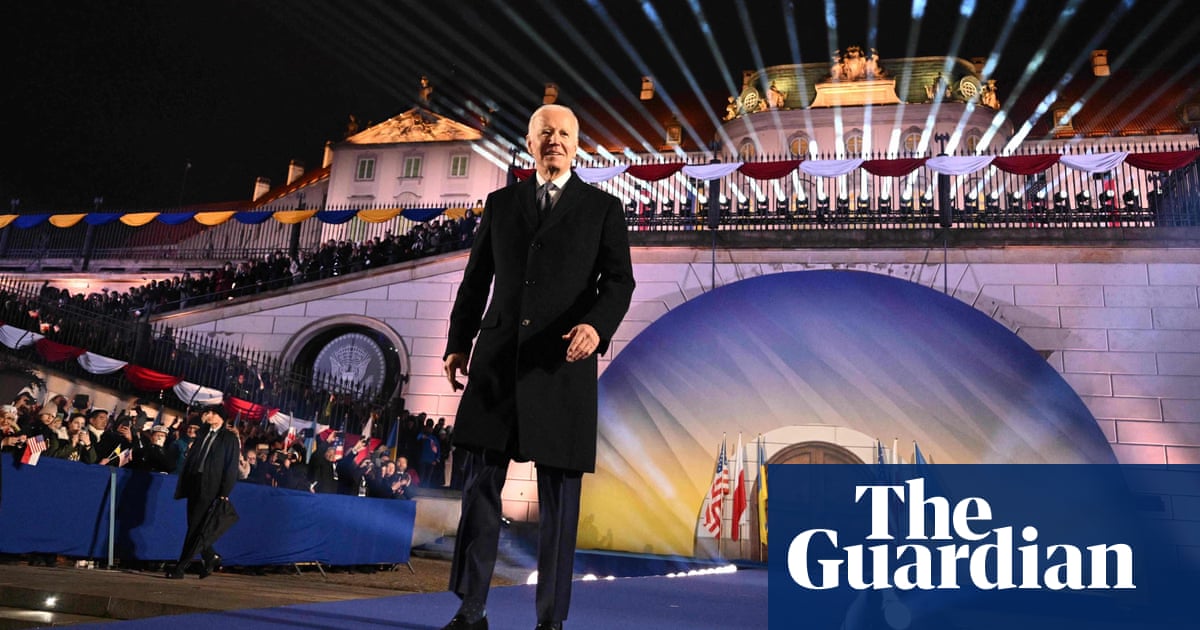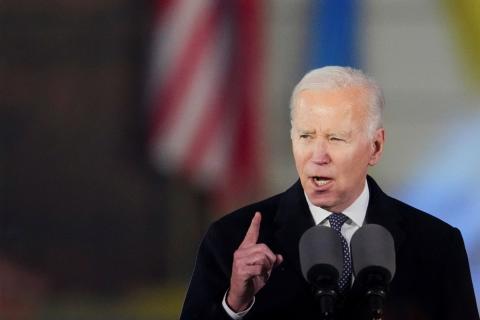
The chair of the progressive caucus of the US House of Representatives, Pramila Jayapal, has retracted a letter sent by 30 of the members urging Joe Biden to engage in direct talks with Russia to end the war in Ukraine following a heated debate within the Democratic party about future strategy over the conflict.
In a statement issued on Tuesday afternoon, Jayapal made a dramatic U-turn, scrapping the letter that had been sent to the White House the previous day and implying it had all been a mistake. “The letter was drafted several months ago, but unfortunately was released by staff without vetting,” she said.
Jayapal went on to regret what she said was conflation of the progressive Democratic call for a diplomatic end to the Ukraine war with a recent statement by the Republican leader in the House, Kevin McCarthy, which threatened an end to aid for the stricken country should the Republican party take back the House in next month’s midterm elections.
Jayapal said: “The letter sent yesterday has been conflated with GOP opposition to support for the Ukrainians’ just defense of their national sovereignty. As such, it is a distraction at this time and we withdraw the letter.”
Jayapal’s retraction is the latest twist in a strange 24 hours of Democratic politics, which has seen the progressive caucus apparently lend its name to a call for direct talks with Moscow to end the war in Ukraine, followed by a fierce backlash and then staged walking back of the position.
In the original letter, sent to the White House on Monday and first reported by the Washington Post, the progressive Democrats called on Biden to make “vigorous diplomatic efforts” towards a “negotiated settlement and ceasefire”. They highlighted the global hunger and poverty that could ensue from Russia’s illegal invasion of Ukraine as well as “elevated gas and food prices at home”, concluding that America’s top priority should be to seek “a rapid end to the conflict”.
Perhaps the most controversial aspect of the letter was the proposal that Biden should explore “incentives to end hostilities, including some form of sanctions relief” for Russia.
The letter provoked fierce pushback from several Democratic lawmakers – including one of its own signatories – and elicited a frosty White House response. It was interpreted as the first sign of friction over Ukraine within the Democratic party, which has until now stood firm behind Biden’s unconditional backing of Kyiv in its battle to defend and retrieve its sovereign territory from Moscow.
The timing of the correspondence was also criticised, coming at a crucial stage in the war and just a week after Kevin McCarthy, the top Republican in the House, said that Congress was “not going to write a blank check to Ukraine”.
The blowback from Democrats was so intense that within hours of the letter being dispatched, Jayapal was forced to issue a “clarification”.
“Let me be clear: we are united as Democrats in our unequivocal commitment to supporting Ukraine in their fight for their democracy and freedom in the face of the illegal and outrageous Russian invasion, and nothing in the letter advocates for a change in that support,” she said.
The original letter was signed by several of the most prominent leftwing Democrats in the House, including the so-called “Squad” of Alexandria Ocasio-Cortez, Ilhan Omar, Ayanna Pressley and Rashida Tlaib. Jamie Raskin, a member of the House committee investigating the January 6 insurrection at the US Capitol, was also among the 30.
The White House responded by repeating Biden’s central approach – that Ukraine will decide for itself when and how to negotiate with Russia. The press secretary, Karine Jean-Pierre, reiterated that there would be “nothing about Ukraine without Ukraine”.
Individual Democratic lawmakers were more pointed in their reaction – including signatories. Mark Pocan, a congressman from Wisconsin who signed the letter, said it had first been drafted in July and indicated that he had been caught off guard by its publication.
“I have no idea why it went out now. Bad timing,” he said.
A second signatory, Mark Takano of California, put out a statement after the letter was revealed saying he remained “steadfast in support of the Ukrainian people”.
Ruben Gallego of Arizona, a member of the progressive caucus who declined to sign the letter, posted an acerbic response on Twitter. He wrote: “The way to end a war? Win it quickly. How is it won quickly? By giving Ukraine the weapons to defeat Russia.”
The sharpest comment from any Democrat came from the former marine and representative from Massachusetts, Jake Auchincloss. He condemned the letter as “an olive branch to a war criminal who’s losing his war. Ukraine is on the march. Congress should be standing firmly behind [Biden’s] effective strategy, including tighter – not weaker! – sanctions.”
After the initial eruption of criticism, some of the progressive signatories defended their action. Ro Khanna of California, who pointed out that he had voted for each of the aid packages to Ukraine, said: “Our nation should never silence or shout down debate.”
Congress has so far approved about $66bn for Ukraine since the Russian invasion began in February, including military, humanitarian and economic help. With Ukraine stepping up its advance on Russian positions as a potentially punishing winter approaching, and with the US midterm elections looming on 8 November, the progressives’ letter could not have landed at a more sensitive time.
Russia specialists warned that the intervention could embolden Putin and loosen US commitment to lead the international coalition in support of Ukraine. Yoshiko Herrera, a political science professor at the University of Wisconsin-Madison, said, “The biggest problem in the letter is that it may weaken US support for Ukraine by fostering the appearance of divisions among those who support Ukraine.”
Cracks, albeit fine ones, are already clearly visible on the Republican side. The largest aid package for Ukraine, amounting to $40bn, was passed in May with 57 Republicans in the House and 11 in the Senate voting against.
Supporters of the letter said that it reflected a desire to end the war through diplomacy – an aspiration which Biden himself has championed. He was explicit about that goal in a speech he made in Delaware in June.
Biden said: “It appears to me that, at some point along the line, there’s going to have to be a negotiated settlement here. And what that entails, I don’t know.”












